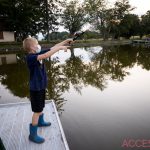Truth is, Hoy Park wanted to start the season in Triple-A.
The 25-year-old infielder spent all of 2019 at Double-A, and he got an invite to this year’s version of the New York Yankees’ alternate site at PNC Field. So, expecting to suit up on opening day for Scranton/Wilkes-Barre wouldn’t be a stretch.
Instead, he returned to Double-A, the odd-man-out of the RailRiders’ crowded infield.
“My (mindset) was, keep playing hard,” Park said.
After 10 more games down there, and with injuries opening up some playing time, he was called up to Triple-A — and for the RailRiders, not a moment too soon.
Park quickly became one of the team’s best players and headed into Saturday’s game batting .344 with a sky-high 1.153 OPS over his first three and a half weeks with SWB. He already has five home runs, two shy of his career high for a season.
“Nuts. Absolutely nuts,” outfielder Trey Amburgey said of Park’s start. “I haven’t actually played with him for an extended period — I’ve played with him a couple times — but what he’s doing right now is absurd. So, it’s fun to watch. We mess around all the time about it. I told him today the ball looks like (it’s as big as) the hotel on top of the hill right now.”
Park started his Triple-A career with a three-hit night against Rochester on May 18. He hit safely in the next five games and already has six multi-hit outings. He’s also supplied a few highlight-reel-worthy plays on defense.
“It was good at Somerset, but when I first played here, playing the first game (I) was more focused on it,” Park said. “The most important thing is I try to help the team, doesn’t matter where I am.”
“It’s been great,” RailRiders hitting coach Casey Dykes said. “It’s been really, really mature, from just the way he’s gone about his work since he’s been here. That was an emphasis, this whole offseason into spring training going into this year, was just for him to focus on the right things. Because he already does some things from bat-to-ball skills, to the way he controls the zone. He does those really, really well. So now it’s just trying to get him to have a little bit more intent in his work and pay a little more focus to the trajectory of the baseball and his intent level, how hard he’s hitting the baseball, and train that as well. Just to make sure that when he is making contact, he’s already in most parts, swinging at the right pitches. So it’s let’s hit those pitches hard. Let’s drive those balls.”
The Yankees liked Park enough to give him a reported $1-million signing bonus in 2014. He was a high schooler in South Korea then, and New York won the recruiting race. Park said he remembers the Texas Rangers made a pretty good pitch, setting up a video conference with Shin-Soo Choo, the longtime big leaguer from South Korea who happened to be his favorite player.
“He told me about being a baseball player, a professional baseball player,” Park said. “He said like, ‘If you come to this team, I’ll be happy. But it doesn’t matter. … Any team, you’ve got to be ready. Be a ready person, be a ready player, be professional.”
He made his pro debut in 2015 and steadily advanced through the Yankees system. In 2019, he batted .272 with a .733 OPS in 113 games at Double-A. He didn’t get invited to the alternate site last year, but was part of the crew that called PNC Field home this April before the minor league seasons started. When they would play scrimmages against the Philadelphia Phillies’ alt-site crew, Park would be the guy who entered the game late, and maybe he would get an at-bat or two. Most of his work came during simulated games while facing his own teammates.
So, Davis didn’t really know what to expect when Park was summoned to his RailRiders. He could tell his hands were his strength, giving him the ability to make plenty of contact in the batter’s box. The power he’s shown so far surprised him.
“But people have told me and guys that have been around him a little bit more, that there’s a little bit in that bat, you know, that he’s got some pull power,” Davis said. “And he’s starting to show that. He’s very confident right now. He’s seeing the ball extremely well. He doesn’t chase much that’s not in the strike zone. He seems to handle high velocity and he seems to handle a lot of slow breaking balls, too. So, right now he’s just in a really good place and very excited for him.”
The Yankees preach hitting strikes hard in their minor leagues. Park has always had a handle on the hitting strikes part, but he’s starting to pay more attention to the quality of the contact he makes.
“I started like trying to hit the ball,” Park said. “I can see the number getting higher and I can see the average (exit velocity), or like how many doubles or homers.
“I used to walk a lot every season. I still want it, but I don’t want — I mean, I want to hit more. I want to hit that ball to the gap, or base hit, line drive up the middle.”
That’s a delicate balance, especially for someone like Park. His strength is getting the bat on the ball, and sometimes trying to hit the ball harder leads to swinging and missing more.
“It’s taking what he already does well, and then making sure that, within his routines, within the way he practices, that he’s also paying attention to more of just an external focus of, ‘Am I hitting this ball on a line? Am I hitting this ball hard?’ And constantly giving him feedback of that while letting him still control the zone the way he does, letting his bat-to-ball skills still play the way that they do. But then just making him aware and making sure that he’s focused on that gear and he’s done a great job that, of asking for feedback and and being receptive to it when it’s given to him.”

Conor Foley goes beyond the box score with in-depth coverage of the Scranton/Wilkes-Barre RailRiders, the Triple-A affiliate of the New York Yankees. He has worked at The Times-Tribune since graduating from University of Scranton in 2011, and he has covered the RailRiders since 2017. Contact: cfoley@timesshamrock.com; 570-348-9125; or @railridersTT




